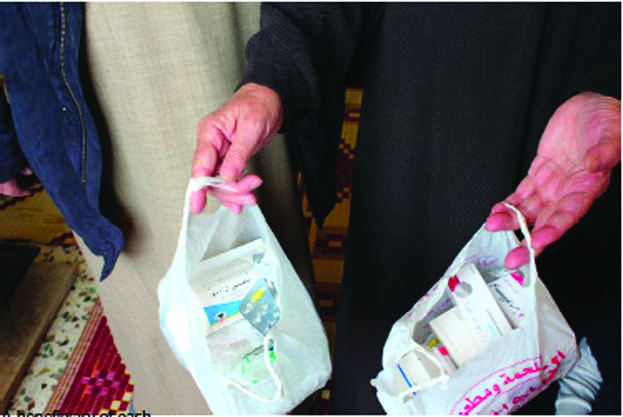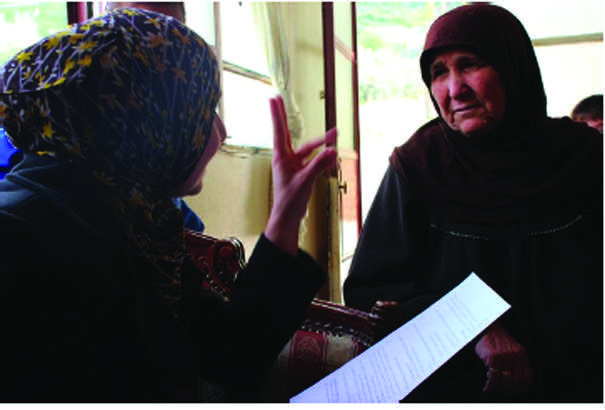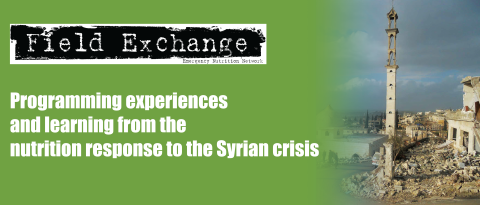IRC cash and livelihoods support programme in Lebanon
 By Francesca Battistin
By Francesca Battistin
Francesca Battistin leads the International Rescue Committee (IRC) cash assistance and livelihoods recovery interventions in Lebanon. She has a background in economics, with ten years professional experience in managing livelihoods recovery programmes in post-disaster and post-conflict settings, including Pakistan, Iraq and Lebanon, and in supporting interventions in Latin America, Africa and South-East Asia, with the International Labour Organisation (ILO) and the IRC.
The author extends thanks for funding support to the UK Department for International Development (DFID), the main donor of IRC’s economic recovery and development interventions in Lebanon, and to Stichting Vluchteling (SV).
Background
 The Syrian conflict is now in its fourth year. Since it started in spring 2011, over 150,000 people have died and more than 2.9 million people found had to flee in neighbouring countries as refugees. In Lebanon, the smallest country bordering Syria, the numbers have grown exponentially; by October 2012, 77,000 refugees had registered in Lebanon, a figure that, within one year only, had increased to 650,000. As of July 2014, Lebanon is hosting over 1.1 million refugees, a fourth of its own population. Tragically, there is no end in sight, as the conflict intensifies and refugees continue to flee to Lebanon each day. Upon arrival, they encounter few housing options or jobs, and women and girls in particular are vulnerable to protection risks as they cope with financial insecurity. The social and economic burdens on Lebanese host communities are also growing, and tensions between refugee and host populations are evident.
The Syrian conflict is now in its fourth year. Since it started in spring 2011, over 150,000 people have died and more than 2.9 million people found had to flee in neighbouring countries as refugees. In Lebanon, the smallest country bordering Syria, the numbers have grown exponentially; by October 2012, 77,000 refugees had registered in Lebanon, a figure that, within one year only, had increased to 650,000. As of July 2014, Lebanon is hosting over 1.1 million refugees, a fourth of its own population. Tragically, there is no end in sight, as the conflict intensifies and refugees continue to flee to Lebanon each day. Upon arrival, they encounter few housing options or jobs, and women and girls in particular are vulnerable to protection risks as they cope with financial insecurity. The social and economic burdens on Lebanese host communities are also growing, and tensions between refugee and host populations are evident.
The first phase of IRC response
 Economic recovery and development interventions were among the first steps taken by the International Rescue Committee (IRC) in response to the Syrian refugee crisis in Lebanon, towards the end of 2012.
Economic recovery and development interventions were among the first steps taken by the International Rescue Committee (IRC) in response to the Syrian refugee crisis in Lebanon, towards the end of 2012.
Assessment of the situation and needs
In August and September 2012, the IRC’s Emergency Response Team (ERT) conducted two rapid assessments in Lebanon – one focusing on the risks and violence faced by women and girls among the Syrian refugee population and the other an emergency livelihoods assessment carried out with Save the Children. Both assessments identified that refugee families were increasingly relying on negative economic coping strategies, such as taking on large amounts of debt, sending children to work, early marriage of adolescent girls and survival sex. The livelihoods assessment, in particular, found the conflict in Syria and the influx of refugees into Lebanon had produced a significant impact on the income and expenditures of both refugees and host communities.
The severity of the needs in Lebanon is most apparent in the Northern governorate, where IRC executes its cash and livelihoods promotion interventions. The North accounts for 21% of the Lebanese population (approximately 900,000 people) and hosts around 26% of the total Syrian refugees in the country (approximately 280,000 persons). Framed differently, Syrian refugees now comprise 31% of the North’s population. The concentration of refugees in the North is even more alarming considering it is the most impoverished governorate in Lebanon; according to a 2008 study by the International Poverty Centre, 46% of the extremely poor and 35% of the poor Lebanese1 reside in the North2.
IRC response
In this context, IRC opted for augmenting refugees’ purchasing power through unconditional and unrestricted (or multi-purpose) cash assistance grants. Unrestricted cash assistance is versatile; it can be spent for multiple purposes, without aid agencies having to determine and closely monitor the use that each beneficiary makes of it. In a context where markets are functioning and elastic, beneficiary households can spend the full amount of the monthly transfers to access the items they need most. Furthermore, in urban refugee environments and protracted crisis like in the case of Lebanon, household needs are particularly diverse and change over time; by giving them the liberty to prioritise among these needs, interventions become more effective and - at the same time - less labour intensive and operationally costly for aid agencies. Unrestricted cash assistance also empowers households to make decisions, which results in a greater sense of dignity. Finally, cash assistance stimulates markets at local levels, whereas large-scale procurements for in-kind assistance tend to exclude small, local businesses from the deals. Recent research conducted by IRC in Lebanon showed that, for every $1 given in cash assistance, at least $2.13 is generated in the wider local economy3.
Cash assistance of 200USD per month is provided; this was set to harmonise with the amount offered by other agencies and is estimated to cover around 50% of the survival expenditure basket since if eligible, a family of six would receive food assistance vouchers worth the value of 180USD. Two subsequent projects were executed between November 2012 and March 2013, and between February and October 20134, with funding from Stichting Vluchteling (SV) and from the United Kingdom’s Department for International Development (DFID) respectively.
A shift in targeting
The first project targeted exclusively women-headed households, while the second one included also men-headed households among the Lebanese beneficiaries. This shift was motivated by three assumptions:
First, IRC had observed that women-headed households were not necessarily more economically vulnerable than men-headed households. This assumption was validated by an analysis conducted in April 2014 on over 28,000 records of refugee households, as part of the work of the Targeting Task Force. Among Syrian refugees, head of household’s gender was found not to be significantly correlated to capacity to earn an income. Secondly, IRC expected that within Lebanese host communities, women heads of households would have more developed and reliable safety nets compared to Syrian female heads of household in a situation of displacement. Instead, Lebanese men in Akkar were particularly affected by the influx of Syrian refugees competing with them in the labour market; their struggle to get access to jobs and income would translate into impoverished households. In the long-run, this was feared as becoming a trigger for tensions among Lebanese host communities and Syrians. The third assumption of the programme team was that, by targeting exclusively women with a very attractive commodity such as cash, beneficiaries may be singled-out and eventually put at risk of exploitation and abuse. It should be noted that no evidence exists to date to corroborate this assumption. Nevertheless, a study by Oxfam and Abaad (Resource Centre for Gender Equality) carried out in Lebanon in 20135, shows how the displacement has shifted gender roles. Syrian women may have become heads of household as a result of fleeing from their country, and had to take on roles and responsibilities they were not traditionally used to. Men reported feelings of powerlessness and stress, for not being able to fulfil their traditional roles of breadwinners and protectors. A cash programme targeting only women would further fuel such a sense of frustration and incapacity to cope with households’ needs. Finally, IRC felt that such a simple and time-saving selection criteria may get easily manipulated, thus leading to unacceptable inclusion error.
Cash was distributed through ATM cards, a modality that IRC was the first to introduce in country and that in Lebanon, is possible due to the widespread presence of banks and ATM outlets. It was then being adopted within the largest multi-agency cash assistance programme during winter 2013-14. For implementing agencies, it is cheaper and safer than distributing cash-in-envelope on a monthly basis, as it requires only a wire transfer to beneficiaries’ accounts.
Challenges and opportunities
Challenges
In April and May 2013, IRC led an inter-agency Emergency Market Mapping Assessment (EMMA), which showed labour markets of the analysed sectors (i.e. construction, services, and agriculture) are becoming increasingly competitive. Due to the increased competition, the EMMA informed of the difficulty for labourers in each of these sectors to secure consistent work; as a result most refugees work only sporadically. Furthermore, even if full-time work was available, the decreasing monthly wages only cover a portion of household expenditure needs. However, the report suggested that the humanitarian sector could intervene within these markets, and maximise the use of existing skills. The UN and WB study on the social and economic impact of the crisis on Lebanon, estimated that 170,000 Lebanese have been pushed into poverty and the unemployment rate has doubled to around 20%, mostly affecting unskilled youth6.
Since May 2013, when the EMMA report was released, the refugee population has grown from around 350,000 to over 1 million persons, of which 45% are of working age. A workforce increase of this magnitude within three years would put a strain even on the most resilient labour markets and economies. It is felt even more so in a relatively small country like Lebanon, where the national labour force is around 1.5 million. At the moment, Syrian refugees of working age constitute almost one third of the national labour force, and this figure is likely to increase.
In this context and even under the most optimistic scenario of an economy picking up, thanks to development and investments efforts that the Government of Lebanon called for, job opportunities will never be sufficient to absorb the entire additional workforce. This will be even more challenging in the most economically depressed areas of the country, namely Akkar and the Bekaa valley. Unemployment will remain high and wages low. Anecdotal information collected by the IRC ERD Programme shows that Syrian refugees accept full-time jobs paid for as little as 200 USD per month, well below the minimum wage of 450 USD. While self-reliance is the lynchpin of sustainable programming, with insufficient jobs opportunities, the continued reduction of humanitarian funding and the subsequent need for greater targeting of food and other assistance, there will continue to be many highly vulnerable households that will not be able to meet their basic needs. Hence, cash aid continues being needed, although more efforts will be made to concurrently create opportunities for income generation and to facilitate access to existing opportunities for the most economically vulnerable.
The Government of Lebanon is particularly concerned with the high competition in the labour market, which causes decline of wages and the parallel increase in unemployment and poverty among Lebanese. Therefore, the Government tends not to support interventions that make Syrian refugees even more competitive than they are. In this complex context, both Syrians and Lebanese men and women should be supported in making a living. On the other hand, the Government of Lebanon is also concerned about large-scale and long-term cash transfer programmes for Syrians, and so far has not supported this type of programme as part of social protection for Lebanese host communities either. Instead, the Government of Lebanon is implementing a social protection programme (i.e. the National Poverty Targeting Programme) that subsidises essential services, such as education, health and access to electricity. It is now introducing a food assistance programme with WFP, similar to the one that is targeting refugees.
The dilemma faced by the humanitarian community is that, by reducing cash assistance, refugees are prompted to look for job opportunities thus competing with the Lebanese workforce. A fine balance must be found between the two types of interventions.
The second phase of IRC response
The current IRC ERD programme in Lebanon started in November 2013 and will run until April 2015 with funding from DFID. It is centred on two types of interventions targeting refugees and poor Lebanese households: the provision of direct income support (i.e. cash assistance) and the promotion of access to income opportunities (i.e. livelihoods support). Cash assistance is given either unconditionally or upon certain conditions; in both cases, it is unrestricted. Appreciating the concerns of the Government regarding cash assistance and how this may create a dependency that they cannot accommodate or sustain, the IRC has enjoyed good dialogue with the Government about the programme. The scale of the IRC programme is small enough not to constitute a real threat/burden; in addition, the IRC programme assists also Lebanese and strives to make sure that they represent 50% of the beneficiaries of all livelihoods promotion activities.
The underlying intention of the programme is twofold. On one hand, cash assistance is mainly to preserve beneficiaries’ assets and savings, and protect them from the abuse and exploitation that may arise from a situation of acute financial need. On the other hand, livelihoods support is to assist beneficiaries by increasing their ability to earn an income on their own, in view of diminishing humanitarian-aid funds in this protracted crisis.
Cash assistance within a humanitarian response has an immediate impact but, presumably, a short-lived effect. It contributes to satisfying essential, immediate needs but it is seldom invested in livelihoods improvements that increase self-reliance. These are not a priority for families in a ‘survival mode’; which are typically more risk adverse than better-off families. Once cash assistance is discontinued, it is likely that recipients will resort (again) to negative coping strategies, unless they can rely on other forms of generating an income. The livelihoods support component of the programme is intended to facilitate the transition to means of making a living in the absence of external income support.
Overview of current ERD interventions (July 2014)
Unconditional cash assistance
Unconditional cash grants of 200USD are distributed on a monthly basis through ATM cards. Beneficiaries – newcomer refugees, as well as the most vulnerable Syrians and Lebanese – are selected through a process combining referrals and household surveys. Candidates are then ranked according to an economic vulnerability score, which considers living conditions and assets, food consumption and coping strategies. Both men-headed and women-headed households are targeted, as the main selection criteria is their economic vulnerability. While the receipients can use the cash as they see fit, the IRC’s post-distribution surveys show that common expenses are food, health care and rent. Households spend part of their cash grants on food even when receiving food e-vouchers.
Financial management training
Around 60% of IRC cash-assistance beneficiary households in the current programme are headed by women. Prior to coming to Lebanon, they were not used to earning an income on their own and they mostly did not have to plan on the use of their household’s money or make financial decisions - their spouses would take the lead on this. Receiving cash assistance is a great relief for these women. However, in spite of being aware of its temporary duration, they generally report not having a plan for when the assistance is over. In collaboration with the IRC Women Protection and Empowerment Programme (WPE), the ERD team provides financial literacy training to interested women heads of household receiving cash assistance. The programme is delivered over 12 sessions across six weeks; topics include household-level budgeting, debt management and negotiation, savings, and banking services. Trainees reported a greater sense of self-confidence and greater participation in decision making within their households, which according to IRC, can ultimately reduce use of negative coping strategies and exposure togender based violence (GBV).
Livelihoods centre services
In February 2014, the IRC opened its Livelihoods Centre (LC) in Akkar. This is a venue for training activities and provides information and employment-related services to job seekers, training providers, and employers. The goal is to help registered applicants find vacancies and training options and to assist employers in identifying employees that match their skills requirements. The LC also provides job seekers with information on legal matters related to work and business set-up in Lebanon. Finally, it assists employers with organising vocational training courses on skills areas where they encouter challenges in finding suitable workforce. The services are provided free of charge to all Lebanese and Syrians residing in Akkar, regardless of registration status. In only six months of operation, the LC has registered over 1,200 jobseekers and referred more than 600 of them to employers or – more broadly – providers of income generating opportunities. Employers that are clients of the LC’s referral services are mostly non-governmental organisations (NGOs) and income generating opportunities include Cash for Work (CFW) and volunteering schemes. These are not jobs in a strict sense, nevertheless they offer temporary access to income for both vulnerable Syrians and Lebanese men and women.
Cash for work (CFW)
The CFW project component creates temporary income opportunities for Syrians and Lebanese while helping to rehabilitate community assets or providing essential services and goods. Beneficiaries – willing and able-bodied Syrians and Lebanese – are selected through an economic vulnerability assessment and livelihoods profiling. Examples of projects include collecting garbage, disseminating information on ERD services;,disseminating information on health and hygiene, and providing child care when caregivers (generally mothers) are engaged in training or income-generating activities. Implementation started recently and 59 beneficiaries have been enrolled so far. In addition, 93 women have been enrolled in home-based Cash-for Product projects; these projects are particularly suitable for women who prefer working from home in order to fit in with the schedule of their other commitments. They are implemented to produce basic goods (e.g. clothing for children) and productive assets to support livelihoods of vulnerable households (e.g. fishing nets).
Skills training
The skills training project component develops professional skills of Syrian and Lebanese beneficiaries to improve their chances of finding work, including opportunities in the expanding humanitarian sector, which is demanding specific skills. The trainings are geared towards occupational areas offering more employment (and self-employment) opportunities than others and are identified based on the information gathered through jobseekers and employers registered at the LC. The training curricula are also developed in consultation with employers, with a view to respond to their training needs. Syrian refugees are trained only on those professions that are allowed to them as per Lebanese labour regulations7. IRC collaborates with local vocational training providers develop the training curricula and conduct the courses. In total, so far IRC has enrolled 258 trainees in training courses: car repair and mechanics, cooking and catering, waiting and hospitality, marketing and sales, psychosocial support and recreational activities for children, knitting and fishing-nets weaving.
Conclusions
While the conflict in Syria continues, in the midst of a widespread escalation of tensions and fighting in the whole region, the likelihood of refugees returning to their home country seems remote. When asked about this possibility last year, ERD programme beneficiaries would respond they were counting on an imminent return and were looking forward to that. Today, their scepticism is growing and their plans for the future are adjusting accordingly. Whilst influx trends in Lebanon are, in fact, decreasing, the challenges ahead are compelling. On the one hand, funds for humanitarian assistance are phasing out and will probably be diverted toward the emerging crises in Iraq and the Gaza Strip. On the other hand, refugees are looking for stability and continue needing aid; host communities are getting poorer.
The humanitarian community and the donors are called to move out of the “emergency mode”, which after three years is considered outdated, and to start laying out interventions aimed at strengthening and expanding community services, providing social protection to the most vulnerable, and finding creative ways of increasing job opportunities. Such interventions should target both refugees and host communities in an equal and need-based way. In this context, the following recommendations may be considered:
- Continue cash and food aid for refugees, and adapt cash assistance programmes based on the learning through recent surveys8.
- Expand the outreach of the National Poverty Targeting Programme, based on an up-to-date assessment of the needs, and increase the assistance package taking into account the growing poverty and diminishing income from work.
- Strengthen community service providers and related infrastructures in essential sectors, such as health and education, as well as solid and water waste management. Capitalise on this for launching large-scale public work schemes, aimed at giving access to income to the vulnerable. In parallel, build the capacities of municipalities and assist them in handling bidding processes in a transparent and effective manner.
- Provide employment services to effectively match labour demand and supply, and convey information on the labour market and labour regulations. Such services should strategically specialise in targeting the humanitarian and development sector, which offer several employment and income-generating opportunities, including CFW and volunteering schemes.
- With an eye to the future, strengthen and expand cross-border livelihoods recovery programmes in areas of Syria where the security situation allows for it. In Syria, this would entail gaining better understanding of the livelihoods and market opportunities, and anticipating which occupational areas are likely to be in demand in the future and throughout the country reconstruction. In the hosting country, such interventions may include vocational training programmes for Syrians in professions with promising futures in Syria, complemented by self-employment kits and financial aid offered when in Syria.
For more information, contact: Alan Moseley, IRC Deputy Country Director for Programmes in Lebanon, at alan.moseley@rescue.org and Francesca Battistin, email: batfrancy@hotmail.com
1 The extremely poor live on an average of 2.40 USD per day, or 430 USD per month for an average family of six, while the poor live on an average of 4 USD per day, or 720 USD per month.
2 Poverty, growth and income distribution in Lebanon, by Heba Laithy, Khalid Abu Ismail, and Kamal Hamdan, Country Study no.13 of the International Poverty Centre, issued in January 2008.
3 Christian Lehmann and Daniel Masterson, 2014. Winterisation Cash Transfer Programme: Impact Evaluation Report. New York: International Rescue Committee (2014). See summary article: Impact evaluation of a cash-transfer programme for Syrian refugees in Lebanon. Field Exchange 48, p56.
4 A summary of a case study of the IRC February-October 2013 programme is included in this edition of Field Exchange.
5 Roula el Masri, Claire Harvey and Rosa Garwod, 2013. Shifting Sands: Changing Gender Roles among Refugees in Lebanon. Beirut: Oxfam and Abaad (2013).
6 Lebanon: Economic and Social Impact Assessment of the Syrian Conflict. UN and WB (2013).
7 The jobs from which Syrian refugees are excluded are: Manager, Deputy Manager, Chief of Staff, Treasurer, Accountant, Secretary, Clerk, Notary, Secretary of the archives, Computer officer, Seller, Jeweller, Bailiff, Driver, Waiter, Barber, e-business activities, Arabic Food chef, teaching in preliminary, intermediate and high school with the exception of teaching foreign languages when necessary, engineering works in various disciplines, nursing, all types of activities in pharmacies, drug warehouses and medical laboratories, and in general all activities and occupations for which Lebanese nationals are available. The jobs they are allowed to secure are: the technical professions in the construction sector and its derivatives (tiling, coating, installation of gypsum and aluminum, steel, wood and decoration works, electrical wiring, painting works, installation of glass and the like), commercial representative, marketing representative, Tailor, Mechanics and maintenance, Blacksmithing and upholstery, Work supervisor, Secretary of warehouse, keeper.
8 See footnote 3


